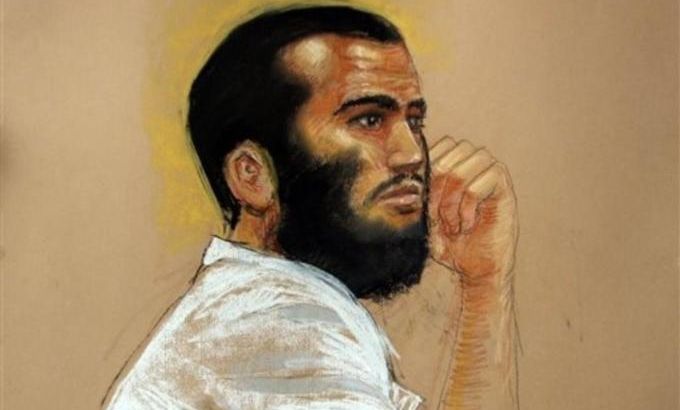Omar Khadr’s return polarises Canada
Partisan politics and media debate erupt as “child soldier” returns to his homeland after years in Guantanamo Bay.

Described as a “convicted terrorist” by his country’s government and regarded by the United Nations as a child soldier, Omar Khadr’s return to Canada late last month has dropped him into yet another role in his young and eventful life: political football.
The match is taking place between Canada and the United States, between the country’s partisan politicians, and in the media.
The Toronto-born 26-year-old spent nearly a decade at the American military detention centre in Guantanamo Bay, Cuba.
He returned to his homeland on September 30, 2012 under the much delayed terms of a deal that saw him plead guilty to what the US considers “war crimes” in return for a commitment that he could serve most of his sentence on Canadian soil.
US officials had made it known that they wanted Canada to take back one of the last remaining citizens of a western country at Guantanamo Bay.
|
““Omar Khadr is a known supporter of the al-Qaeda terrorist network and a convicted terrorist.” |
John Baird, the Canadian Foreign Affairs Minister, said on CTV Question Period: “Omar Khadr is a Canadian citizen – obviously the Americans are closing down the prison, wanting to send him back. Under Canadian law we’re pretty obliged to take him.”
Public Safety Minister Vic Toews, who announced Khadr’s return in a hastily called morning news conference, left no doubt as to his feelings.
“Omar Khadr is a known supporter of the al-Qaeda terrorist network and a convicted terrorist,” Toews said.
His statement had Khadr’s legal team objecting to the minister’s tone, and scolding him for sending the wrong message to those in the prison service charged with planning his rehabilitation.
“It’s regrettable,” said Toronto lawyer John Norris about the minister’s statement. “It seems like nothing more than an attempt to intimidate and influence people who are professionals. They should be left alone to do their job.”
Disagreement over handling
Canada’s opposition politicians have been quick to condemn the government’s handling of the case.
Bob Rae, the interim leader of the Liberal Party, described Khadr’s return as “long overdue”, and said it was “extremely unfortunate” that the Conservative Party government had “delayed” repatriating a “Canadian citizen and a child soldier”.
Rae did not mention that his own party was in power for the first four years of Omar Khadr’s incarceration, and made no attempts to bring him home.
|
“Tweets that link to the UN Convention on the Rights of the Child face off against those reminding readers of Khadr’s confession in 2010 to five serious crimes, including murder and supporting terrorism.” |
Media comments also took issue with the government’s handling of the affair.
Writing in the Globe and Mail newspaper, Doug Saunders, a foreign affairs reporter, pointed out that Khadr and a Canadian convicted paedophile named Christopher Neil arrived back in the country on the same weekend, highlighting that the government made no attempt to prevent the transfer of Neil from Thailand where he had served part of a custodial sentence.
Columnist Michael Den Tandt in the right-of-centre National Post said the two extreme views over Omar Khadr – innocent child soldier or convicted terrorist – were both overly simplistic and the key to rehabilitating the young man lay in a nuanced and careful approach by the justice system in Canada.
At one of those extremes, the right-wing “Sun TV news” commentator, Ezra Levant, took strong issue with Khadr’s return and dismissed arguments that the country was obligated to take him home.
Social media – Twitter in particular – offered large, echoing argument between people who’ll never agree.
Tweets that link to the UN Convention on the Rights of the Child faced off against those reminding readers of Khadr’s confession in 2010 to five serious crimes, including murder and supporting terrorism.
It seems unlikely that a middle ground will be reached.
Lost voice
Lost in the cacophony is the voice of Omar Khadr himself. As a detainee in Guantanamo Bay, and now in Canada, his opportunities to speak have been very limited indeed.
Instead, his words have emerged through the legal process, in 2010, as part of an apology issued at the end of his US military commission.
Most remarkably, the Canadian news magazine Maclean’s recently printed a long article based on leaked transcripts of a seven-hour interview with Khadr by US prosecution witness and psychiatrist, Michael Weiner.
Weiner testified that Khadr was manipulative and dangerous, and “full of rage”.
|
“Nobody would be happy to be at Millhaven [prison]…But it’s not Guantanmo, and that’s what matters most to Omar.” – John Norris, lawyer |
But the young detainee also says he misses “being loved”, and his overwhelming feeling after nearly a decade in custody is “sadness”.
Khadr’s defence lawyers, of course, paint a different picture. The young man that Norris and co-counsel Brydie Bethell have represented for the past two years is quite simply “thrilled to be back in Canada”, according to Norris, despite being housed at one of the country’s most notorious jails for the time being.
“Nobody would be happy to be at Millhaven (Maximum Security Prison),” Norris told Al Jazeera. “But it’s not Guantanamo, and that’s what matter most to Omar.”
For at least the next six weeks, prison officials and members of the parole board and justice system will assess Khadr and draw up a plan to rehabilitate him as he serves the remainder of his 8-year jail sentence.
Under Canadian law, he’s eligible to apply for parole by July 2013